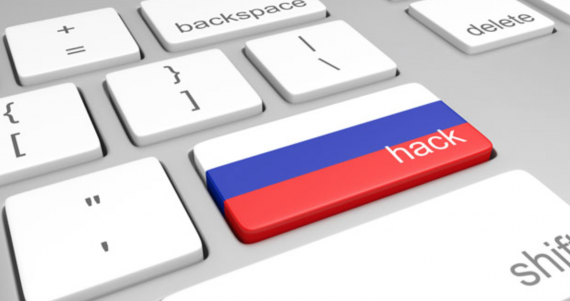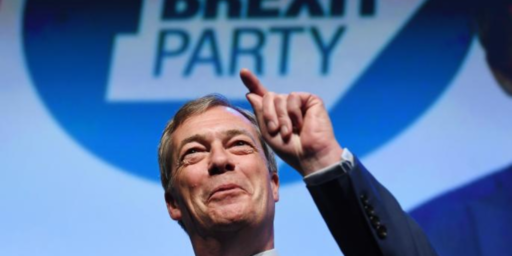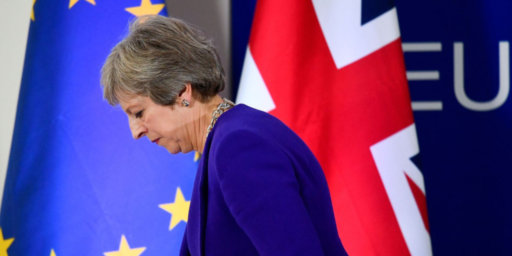Signs Of Russian Meddling In Brexit Vote
It appears Russia attempted to influence last year's Brexit vote in the same manner it did the 2016 election in the United States.
The New York Times reports that there are signs of Russian meddling in last year’s British referendum on whether the United Kingdom should remain in the European Union:
LONDON — More than 150,000 Russian-language Twitter accounts posted tens of thousands of messages in English urging Britain to leave the European Union in the days before last year’s referendum on the issue, a team of researchers disclosed on Wednesday.
More than 400 of the accounts that Twitter has already identified to congressional investigators as tools of the Kremlin, other researchers said, also posted divisive messages about Britain’s decision on withdrawing from the bloc, or Brexit, both before and after the vote.
Most of the messages sought to inflame fears about Muslims and immigrants to help drive the vote, suggesting parallels to the strategy that Russian propagandists employed in the United States in the 2016 election to try to intensify the polarization of the electorate.
The separate findings amount to the strongest evidence yet of a Russian attempt to use social media to manipulate British politics in the same way the Kremlin has done in the United States, France and elsewhere.
The disclosures came just two days after Prime Minister Theresa May of Britain delivered a speech accusing Russia of using cyberattacks and online propaganda to “undermine free societies” and “sow discord in the West.”
On Tuesday, the chief of the National Cyber Security Center released a summary of a prepared speech asserting that in the past 12 months, Russian hackers had unleashed cyberattacks on the British energy grid and the telecommunications and media industries.
Taken together, the flurry of reports and accusations adds to growing pressure on Twitter, Facebook and other social media companies to disclose more of their internal records about advertising payments and account registrations, information essential to illuminating the extent of Russian meddling in the referendum on Brexit.
Any evidence that Moscow did, however, may also complicate the already vexed politics surrounding the issue.
Social media companies disclosed Russia’s role in the American election only after prodding by Congress. Facebook, for example, disclosed this year that, over 32 months, the Kremlin-linked Internet Research Agency had paid more than $100,000 for online advertising, posted 80,000 pieces of divisive content and reached more than 126 million Americans.
The Kremlin has long sought to weaken or divide the European Union, perceiving it as a rival for influence in countries from the former Soviet bloc. And Russia’s main propaganda outlets like Sputnik and Russia Today pushed hard for Brexit.
But the British government, consumed by the negotiations for an exit from the European Union, has not yet obtained similar disclosures. Although a parliamentary committee recently asked the social media companies for information, many critics have argued that the government has little appetite for an inquiry that could muddy its mandate.
The social media companies, including Facebook, Twitter and Google, have had little incentive to volunteer information about the exploitation of their own platforms. And the predominantly right-wing, pro-Brexit British press, particularly the powerful tabloids, have little enthusiasm for undermining the validity of the referendum.
That dynamic may now be changing. The Times of London reported on Wednesday that a team of researchers working on an unrelated and still-unpublished study had identified 156,252 Twitter accounts that listed Russian as their language but posted messages in English to argue against the European Union.
The researchers, Oleksandr Talavera and Tho Pham, of Swansea University in Wales, said in interviews on Wednesday that the Russian accounts, which had posted very little about Brexit in the month before the referendum, became quite active at the last minute: from about 1,000 a day two weeks before the vote to 45,000 in the last 48 hours and 39,000 on the day the results were announced, June 24, 2016.
“It is very strange that someone whose language is Russian tweets in English,” Ms. Pham said — describing it as an anomaly that had prompted the researchers to look more closely at 10 of the most active accounts under suspicion.
Nine had been deleted, and the last, Sveta1972, appeared to emanate from a Russian resort town. On the eve of the referendum, Sveta1972 urged Britain to “make June the 23rd our Independence Day.”
Related findings by a separate team of researchers were reported this week by The Guardian, a strong opponent of Brexit. Those researchers had collected a sample of more than 60 million Twitter posts using hashtags related to Brexit.
They found that 419 of the 2,752 accounts already identified by Twitter to congressional committees as being linked to the Kremlin had posted 3,500 times using Brexit hashtags.
(…)
A third, smaller survey, reported last week by Wired magazine, found that 29 of the Russian-linked Twitter accounts identified to Congress had also tweeted 139 times about Britain or Europe. Blaming terrorist attacks on Islam or railing against immigrants were favorite themes, said Jonathon Morgan, chief executive of New Knowledge, a digital security firm based in Austin, Tex., that conducted the survey.
“Many of these accounts strongly pushed the narrative that all Muslims should be equated with terrorists and made the case that Muslims should be banned from Europe,” he said. “That is very consistent with the Russian strategy on U.S. issues, and the fact that they were using the same tactics to target Europeans is extremely telling.”
This news isn’t entirely surprising, of course. In addition to the allegations regarding Russian interference in the U.S. election last year, the Putin regime has allegedly attempted to interfere in a number other nations. In recent months, for example, it’s been established that there was an active Russian effort to interfere in the French national elections that took place earlier this year. More recently, Spain’s national government has claimed that it has found signs of Russian interference in the Catalan independence referendum, mainly through the use of social media and other means to spread misinformation and propaganda via social media and other means. Given how divisive the Brexit vote was, and how divisive it remains in the United Kingdom today, the idea of Russia seeking to influene the debate if not directly impact the outcome is hardly surprising.
As with the allegations regarding Russian interference in the 2016 Presidential election here in the United States, there doesn’t appear to be any allegation that the Russian interference can be proven to have had any impact on the race or that there was ever any serious cyber threat to the computer systems used to tally and track votes. Even leaving that aside, though, the fact that the Russians are engaging in behavior like this, while hardly surprising, is yet more evidence of the extent to which the Putin regime is committed to sowing chaos in other nations by seeking to influence elements on the political extremes and to throw the results of democratic elections into doubt. Putin’s strategy on this part seems to be two-fold. First, such maneuvering would arguably throw the political systems of potential Russian adversaries off-course and allow him to pursue his own aims in areas such as Ukraine and other parts of Eastern Europe and in areas such as Syria and the Middle East. Second, throwing the results of democratic elections into doubt allows him to claim that the alleged moral superiority of the West when it comes to democratic norms is a chimera. Finally, to the extent such meddling helps to ignite the political extremes in other parts of the world, it adds to the chaos that Russia would like to exploit.
At the very least, allegations such as these are serious enough that they warrant further investigation and a thorough discussion of what, if anything, can be done to counter them. I am reluctant to support the idea of placing communications via Twitter, Facebook, or any other form of social media or communication under government regulation, but it does seem clear that these companies need to be clearer and more open about the sources of political advertising that take place through their services, and more careful about how they allow individual account holders to set up accounts or use their advertising services. Additionally, there probably ought to be better disclosure of the sources of the funding for politics-based advertising campaigns on these services, especially if there’s evidence that the funding sources come from overseas or from sources that are essentially untraceable such as Bitcoin payments. The sheer number of users on these services, though, and the number of posts per day on each of them, means that it’s next to impossible for either company to effectively track what is happening or who might be behind it until well after the fact. At the very least, though, users need to become far more skeptical when it comes to sharing memes and other postings with political content. Additionally, governments need to become far more vigilant in making sure that the voting infrastructure itself is secure against intrusion or manipulation. If not, we could be headed for even more chaos in the future, and that appears to be exactly what Putin wants.






If we had a president who was not a traitor, we might strike back at the Russians. If Mrs. May was not leading a cabinet of doddering cretins, she might join with our traitor president and do something. But the Russians judged their moment well and exploited the big weakness of democracy: voters.
Maybe next president. But the damage done by Brexit will be impossible to repair short of a Parliament growing some balls and stepping in to stop the madness.
I only check the top of my feed in Facebook as that’s where I see pictures my wife has posted. When I first signed up I quickly realized that clicking on “news” in Facebook is a waste of time. It’s mostly just crap. There are only a few US news organizations that have the capacity to do real reporting. Everything else is just opinionated people nattering at each other, and telling ever wilder stories to back up their point. And I’ve never been on Twitter. 100 times worse than Facebook. A complete waste of time.
Of course this had an affect. The Brexit was behind in the polls … until the very last moment. Which corresponds with this targeted anti-EU propaganda deluge from the Russians.
Also – never underestimate the malign influence of Rupert Murdoch’s media empire on public opinion and discourse. All the Russians need to do is start amplifying the stuff that Murdoch injects into politics … because all the groundwork has already been laid down. It isn’t rocket science.
It’s not like we didn’t interfere in the Russian election to get Yeltsin elected.
And now the same people who ridiculed Romney and said that the 80s called and want their foreign policy back, are now shocked–SHOCKED!!–that the Russians aren’t totally trustworthy.
You can’t be serious.
There’s been a batsh*t-insane anti-EU Tory contingent since Day One, so I don’t think it took that much nudging.
@grumpy realist:
And the same is true regarding the US, Fox News and talk radio had already poisoned the minds of millions, Russia really didn’t have to do a lot to get results…
A major power trying to (underhandedly) influence another major power’s politics? That’s probably been the norm for say the last 4000 years. Not that it has to be a major power, influencing minor countries is also good fun. The problem is when leaders in the influenced countries go along with it.
So: Russia meddling in American and British politics? Pretty much normal, as is the reverse.
But: Trump thinking its not a big deal? Now that’s a problem. I don’t blame Putin for this, any more than I blame Clinton for meddling in getting Yeltsin in power in 1996. However, that Trump is going along with it is a very different thing.
@grumpy realist: @PJ:
Both the US election and Brexit were decided by thin margins. It’s nonsense to simply assume the Russians had no effect. I mean, none? Not a single voter? And if one voter why not ten thousand? Or a hundred thousand?
@michael reynolds:
Not saying that it had no effect. But it was a lot easier with all the groundwork already done.
Conservatives have been hating on the EU for ages. So, while I’m sad for the those who voted to Remain and even for the Brexiters who will end up regretting their vote, we will find out what leaving the EU gets you. And when the UK (or what’s left of it) votes to rejoin in the future, it won’t get the same deals that Thatcher got when it first joined.
@michael reynolds: I’d say asking what effect it had is the wrong question; it’s looking at the branches rather than the roots. Twitter’s business model encourages and benefits from mass fake accounts because Twitter itself is a fake company. Somehow our system allows a business significantly based in fraud to accumulate the power for foreign governments to potentially shift public opinion.
But we aren’t supposed to question that because markets/capitalism.
Go mainstream media!
Catchy and misleading title with an irrelevant and
misleading story.
The very definition of click bait propaganda.
The article seeks to undermine the voice of Britain and its people by claiming the results of the vote resulted from a Russian hack.
Yet even the story uncovers nothing indicating a “hack”,
Using social media the way it has been designed to work
is not hacking, seeking to influence maybe.
It tries to reinforce the claim of the Russians hacking the US election for which is propaganda in and of itself.
I believe we have entered the hypocritical house of mirrors.
@Ashley:
That’s complete word salad.
If the Russians were seeking to influence a US election for the benefit of the Democrats, I think your “fake news” claims would vanish in an instant – and you would be demanding investigations, corporate prosecutions, new intelligence agency powers, and more. That’s the hypocrisy I see here.
Just for one example … consider the ginned-up controversy about the “Uranium One” deal, and whether the Clinton Foundation got a donation in connection with it.
Corruption is not a one-way thing, where Republicans (and their Russian allies) or the Brexit crowd are absolved because … hey, the right team won!
@PJ: My feeling is that the UK hasn’t yet figured out how much a poisonous mess they’ve made of their reputation already in Europe. When they knock on the door again, I wouldn’t be surprised if the EU simply says “No!”
@michael reynolds:
A good point but that works both ways. When the margin is that thin, almost anything can be blamed for deciding it. As it as with Clinton-Trump, so it is with Brexit: it should not have been close enough for such things to matter. This was catastrophically misplayed by the Conservatives.
I’m shocked shocked I tell you to discover that users and owners of social media platforms are corrupt and corruptible.
@Ben Wolf:
Interestingly, my eldest daughter takes the same view about Twitter. She’s the smartest person I know, and the one I test ideas on – if an idea can withstand her it’s pretty solid.
@Hal_10000:
That is absolutely true, which is why I blame the voters. It’s not Trump’s fault he’s president, it’s the voters’ fault. Same with Brexit. Democracy has few safeguards against extreme voter malpractice.
@Ashley:
https://en.wikipedia.org/wiki/Social_hacking
In the early days of hacking networks one of the most important parts of being a hacker was being able to manipulate people into giving you useful information.
ala
https://en.wikipedia.org/wiki/Social_engineering_(security)
Some of the biggest hacks out there came about because one of the hackers was able to manipulate someone into divulging sensitive information.
EDIT : Yes I do realize I am most likely just responding to a paid Russian poster.
@Matt:
Don’t assume “Ashley” is actually human, rather than simply programmed by one.